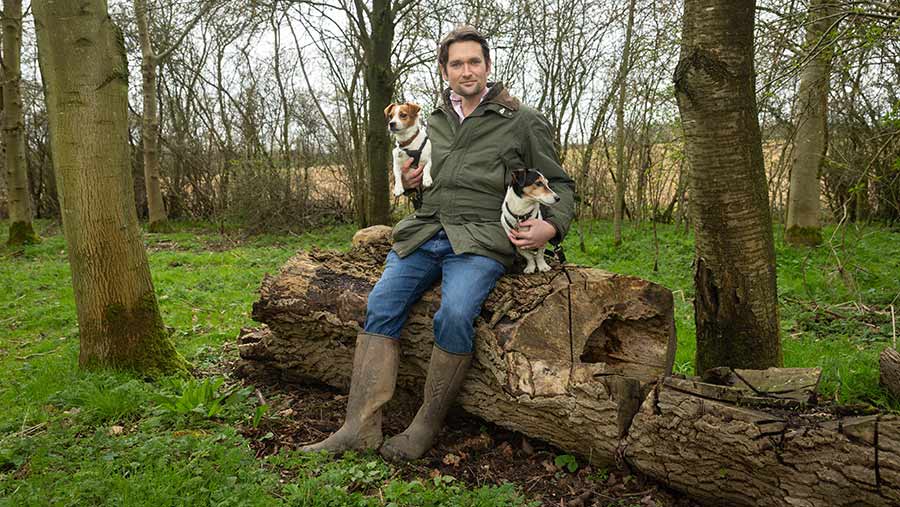Opinion: Why we need to get better at talking about mental health
 © Tim Scrivener
© Tim Scrivener It was heartening to see the NFU convene a well-attended parliamentary event on the issue of rural mental health, drawing on a members’ survey indicating that the tumultuous state of the industry in recent years was having a significant impact on the wellbeing of many farmers.
In May, the Environment, Food and Rural Affairs committee, the parliamentary body which oversees the work of Defra, released its own report which also highlighted the parlous state of mental health in the countryside.
See also: Opinion: time to call time on the sexist ‘dinosaurs’
This report drew on the Royal Agricultural Benevolent Institution’s Big Farming Survey, which as long ago as 2020-21 flagged the worrying statistic that fully 36% of 15,000 respondents were likely depressed, with 47% experiencing anxiety in their everyday lives.
Nearly 20% had experience of someone who had taken their own life.
A survey of 900 young farmers by the Farm Safety Foundation earlier this year found that 94% of respondents believed mental health was the biggest issue facing the industry.
Women are more likely than men to be feeling strained, perhaps a result of balancing the responsibilities of farm, family and, often, a second job.
None of this is a surprise.
Acute pressures
Recent years have seen acute pressures arrive in waves, many stemming from the reduction in financial support and lack of certainty and labour represented by the decision to leave the EU, alongside Covid-19 and the war in Ukraine.
But there are also chronic, underlying factors: the insidious threat of bovine TB; climate change; fundamental income volatility; frequently challenging family dynamics; isolation and lone working; hard, long hours and lack of holiday; the crushing weight of multi-generational responsibility; and rural crime.
Add to that the stresses and strains of a normal human existence.
As with other issues in recent years – such as health and safety and succession planning – it’s positive that farm mental health is getting more exposure than used to be the case.
Yet I would suggest that talk of mental – as opposed to physical – health still retains an unhelpful stigma which delays people seeking help or sharing the load.
And despite more talk on all of these issues, I fear there is insufficient progress on the ground among those who need it most.
On Christmas Day 2022, I found myself googling the symptoms of depression and anxiety, and found I had a full house.
Upon confiding to my wife that evening, I explained I’d suspected as much for a while, but had been suppressing it for the past year. She shook her head and said: “Two years.”
Despair is corrosive. It drains the colour from life and infects those closest to you in a way a physical ailment cannot.
There is help
Failing to seek help and trying to “push through it” only makes things worse, and you’ll be little use at home or work.
And there is help. There are a multitude of specialist agricultural mental health and other support charities available, alongside those options from the NHS and more generalist organisations.
Like any ailment, depression can be treated and we can heal. But we must give ourselves a break and leave the macho stuff in the last century.
If you’re struggling, reach out. If you see someone struggling, put an arm around them and ask how they’re doing, how you can help. Tomorrow always holds out the hope of being a better day.
Farming charities and professional support
Rabi
- rabi.org.uk
- 0800 188 4444
- help@rabi.org.uk
Emotional, practical and financial support from in-person counselling to mental wellbeing training.
Rsabi
- rsabi.org.uk
- 0808 1234 555
- rsabi@rsabi.org.uk
Emotional, practical and financial support for people involved in Scottish agriculture.
Yana
- yanahelp.org
- 0300 323 0400
- helpline@yanahelp.org
Rooted in East Anglia, Yana offers a confidential helpline and counselling for individuals and their families.
The Farming Community Network
- fcn.org.uk
- 03000 111 999
- help@fcn.org.uk
Services range from help with animal welfare, finance and farm paperwork to support with mental health and relationship issues. Calls answered in person 7am to 11pm daily.
The DJP Foundation
- thedpjfoundation.co.uk
- 0800 587 4262 (or text 07860 048 799)
Offers a counselling service as well as text-based support across Wales.
Shout
- Text Shout to 85258
A text-based service for mental wellbeing support.
